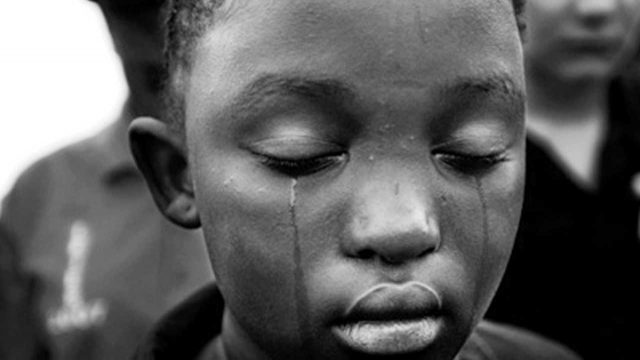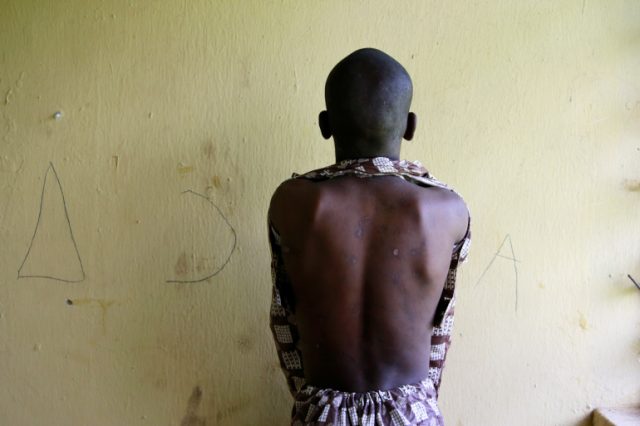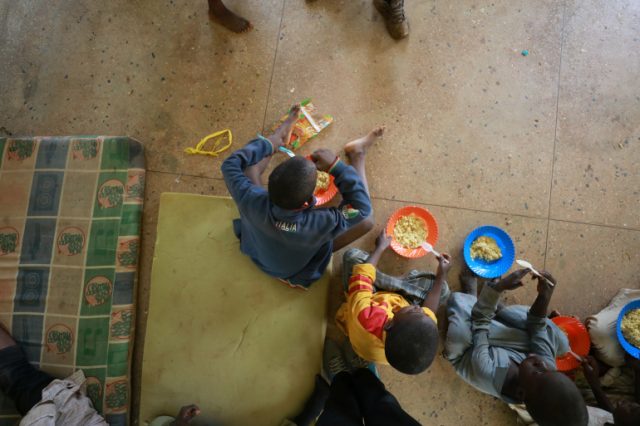The “Justified” Sexual Abuse of Boys in Muslim Countries

Last week, a total of 333 boys from the Government Science Secondary School—an all-boys boarding school—were kidnaped by Boko Haram in the northwestern state of Katsina, Nigeria.
While this story got some news coverage, one tragic account, among many of the like, that hardly got any recognition by the mainstream media was yesterday’s report of the raping of a twelve-year-old boy in the predominantly Muslim Nigerian state of Kaduna—the incident occurred in September.

The boy’s mother, Adara, said that her son had been suffering from repeated night terrors. Upon examining him some months back, it had taken her a moment to digest what she had seen. He had a festering wound and his underwear was stained with semen.
Her son told her that a tailor in the neighborhood and his friends had been abusing him in their shop since a partial coronavirus lockdown began in March. Adara knew the perpetrators—men in their early 20s who lived in the same community. The twelve-year-old said he had been scared to tell anybody. The men gave him sweets and money and warned that if he said anything, they would kill his entire family, he said.
In fact, while some may claim this as an isolated incident, in the Imam Ahmad Bun Hambal School, which Adara’s son attended, hundreds of boys were reported sexually abused last year. While one would think in a so-called Muslim conservative region, the sexual abuse of boys by adult men would be a taboo since Islam “officially” condemns homosexuality. Yet the sodomizing of boys tends to be more rampant in Islamic countries than one would think.
Dr. Shuaibu Musa, a pediatrician in Kaduna state at the Barau Dikko Teaching Hospital, recounts that on a Tuesday evening in September, he had just arrived home from work when an alert he received sent him right back to the hospital. A five-year-old boy had been admitted with diarrhoea. But the medical team suspected it was an assault.
Musa has become used to such alerts. “The sort of abuses we see, you will be shocked,” he says.
Doctors here say they treat children who have been sexually abused every day. It is why Musa and other professionals set up a committee to tackle such cases. Medically, treatment is often focused on the injuries sustained, as some attacks are violent.
Child victims of this type of rape sometimes lose the ability to control their bowel movements. “When we probed and probed it turned out to be child sexual abuse.” The parents, in order to avoid further shame, try to keep the abuse of their boys quiet.
Abuse of Boys in the Islamic Republic of Pakistan
In May, the Associated Press reported how in the Islamic Republic of Pakistan there were numerous accounts of sexual harassment, rape and physical abuse by Islamic clerics teaching in madrassas (religious schools) throughout the country, where many of the country’s poorest study—a large majority of the reported cases are boys who have not or have barely reached the age of puberty. Among recent cases:
- Muhimman, an eleven-year-old—who can only write his name slowly, carefully, one letter at a time—earlier this year, a cleric at the religious school he faithfully attended in the southern Punjab town of Pakpattan took him into a washroom and tried to rape him.
- Yaous, an eight-year-old from Pakistan’s remote northern Kohistan region, who near the end of December last year—most students were away because it was a holiday at the madrassa; only Yaous and a handful of students had stayed behind because his village was hours away, and the cost of transportation home was too much for his parents—while the other students had gone to wash their clothes, he was dragged into a room by the mullah who then locked the door and abused him. “It was so cold. I didn’t understand why he was taking my warm clothes off,” Yaous said.
There are more than 22,000 registered madrassas in Pakistan, teaching more than 2 million children. But there are many more religious schools that are unregistered. They are typically started by a local cleric in a poor neighborhood, attracting students with a promise of a meal and free lodging. Regrettably, there is no central body of clerics that governs madrassas.
More than eight children were subjected to sexual abuse on average every day in the first six months of 2020 in Pakistan, according to child protection NGO Sahil.
Out of the total reported cases, 62% were from rural areas and 38% reported from urban areas
At least 173 children were gang-raped, whereas there were 227 reports of attempted sexual assault. Moreover, 38 children were killed after they were sexually abused—of the total children who were subjected to sexual abuse, 53% were girls and 47% boys.
The sexual molestation and prostitution of boys is also a rampant phenomenon in the Islamic Republic of Afghanistan.
Justifying the Abuse
In what is called Bacha Bazi (boy play), boys are dressed like women and dance for their would-be male predators—primarily Sunni Pashtun Afghan males. The practice often includes child pornography, sexual slavery and prostitution.
It is believed by some that this corrupt behavior stems from “[t]he seclusion of women and the practice of polygamy [which] limit[s] the access of young men to normal heterosexual outlets for their urges, so Islamic societies, particularly in the less developed areas, have come to resemble prison culture with their sexual predators and [defenseless young males].”

Others claim that this normalization of sodomy, despite Islamic teaching prohibiting it, is the result of Pashtuns being sheltered by their pastoral setting and unable to speak Arabic—the language of all Islamic texts—for which many Afghans allow social customs to trump religious values, including those Quranic verses eschewing homosexuality and promiscuity.
Pashtun social norms, which remain “largely misogynistic and male-dominated due to deeply-ingrained Islamic values,” hold that Bacha Bazi does not oppose Islamic teachings on homosexuality or pedophilia, and is far more ethical than defiling a woman.
So long as the man does not love the boy, the sexual act is not reprehensible, provided that the perpetrator is the only active partner in the encounter. Some assailants claim that they can have sex with boys, referring to some hadiths that apparently are used to encourage such behavior:
- Narrated Anas bin Malik: “Whenever Allah’s Apostle went to answer the call of nature, I along with another boy used to accompany him with a tumbler full of water. Hisham commented, “So that he might wash his private parts with it.” —Sahih Al-Bukhari, Volume 1, Book 4, Number 152; see also Numbers 153-154
- Buhaysah reported on the authority of his father: My father sought permission from the Prophet. (When permission was granted and he came near him) he entered him and his shirt, and began to kiss him and embrace him. —Sunan Abu Dawood, Book 9, hadith 1665
- Mua’wiya said: “I saw the prophet sucking on the tongue or the lips of Al-Hassan son of Ali, may the prayers of Allah be upon him. For no tongue or lips that the prophet sucked on will be tormented (by hell fire).” —Musnad Ahmad, 16245
- Usaid ibn Hudair reported: While he was talking to people and telling jokes to make them laugh, the Prophet, peace and blessings be upon him, poked him in the side with a staff. Usaid said, “Let me retaliate!” The Prophet said, “Take retaliation.” Usaid said, “Indeed, you are wearing a shirt and I am not.” The Prophet lifted up his shirt, so he hugged him and kissed his torso (from his belly button to his armpits). Usaid said, “This is all I wanted, O Messenger of Allah.” —Musnad Ahamda, Sunan Abu Dawood, hadith 5224
Alienation of Victims
Unfortunately, the victims of sexual crimes, instead of getting support from their Muslim brethren in their community, normally get ostracized.
“The stigma is disgusting,” Adara says, speaking in her native language, Hausa. When her son goes outside to play, “neighborhood kids tease him that he was pimped out”.
Adara faced a backlash from her family as well and has been ostracised since going to the police. “My husband’s family advised him to leave me, and now he has left. I am the only one looking after the kids,” says the mother of four.
“I know people in the community, that their children were raped and they did nothing. They said: ‘Oh, it’s a community thing’, but because I am standing up they are now standing against me,” she says.

According to Dr. Musa, “Nobody wants you to report it,” he adds. “People don’t want their family names to be dragged through the mud. And because of that, they will rather keep quiet and say they will handle it within the community.” Last year, UNICEF renewed its call urging Nigeria’s federal government to create safe and secure outlets for children to report cases.
While sexual abuse is not limited to the Islamic world, one has to distinguish that in the West it is considered a crime, notwithstanding shameful cover-ups; in the former, it is still justified by the criminals who commit the acts and the sharia-based imams.
It is time that we make our voices heard for the victims and stop being complicit by sustaining the politically correct position that such heinous acts have nothing to do with the Islamic texts.
__________________________________________________

Mario Alexis Portella is a priest of the Cathedral of Santa Maria del Fiore and Chancellor of the Archdiocese of Florence, Italy. He has a doctorate in canon law and civil law from the Pontifical Lateran University in Rome; he also holds a M. A. in Medieval History from Fordham University, as well as a B.A. in Government & Politics from St. John’s University. He is also author of Islam: Religion of Peace? – The Violation of Natural Rights and Western Cover-Up.
Book available on Amazon, Barnes & Noble or WestBow Press.






Recent Comments